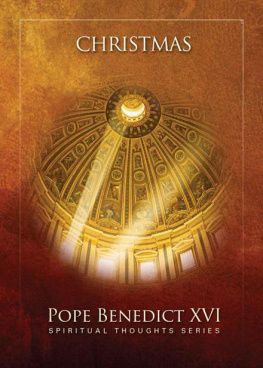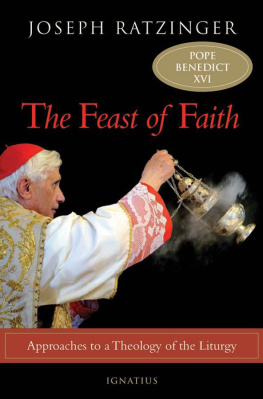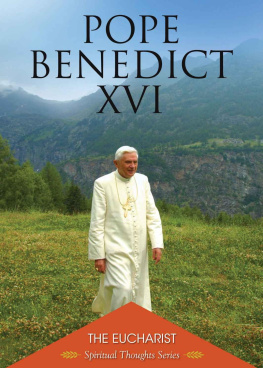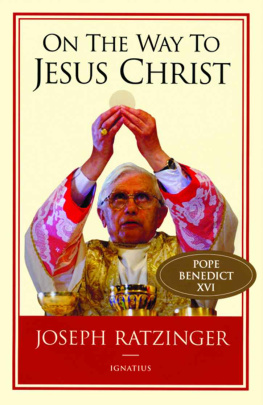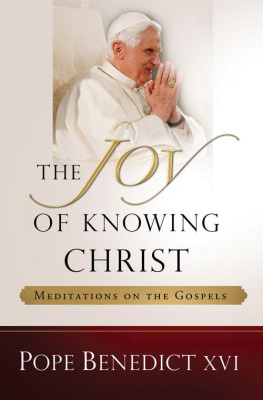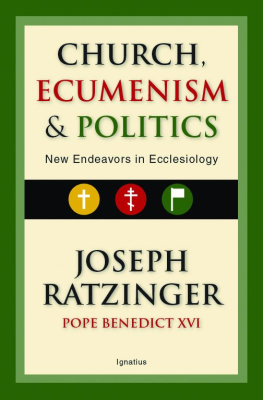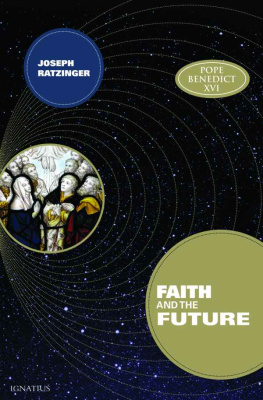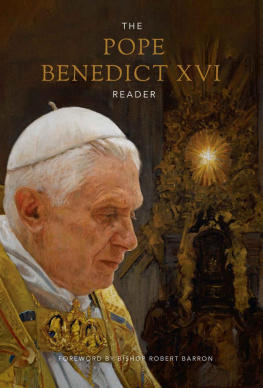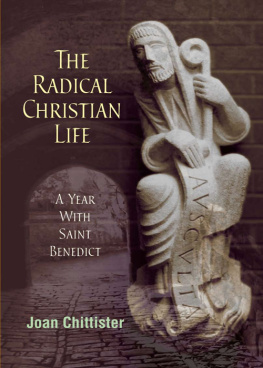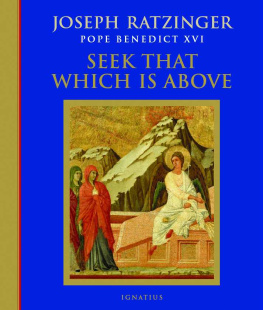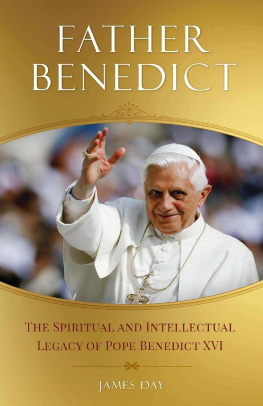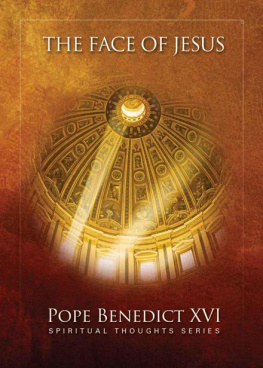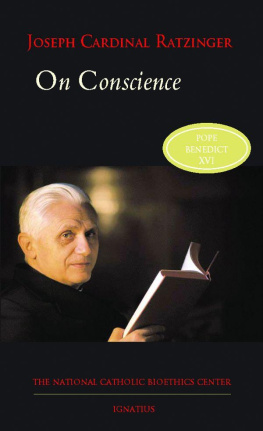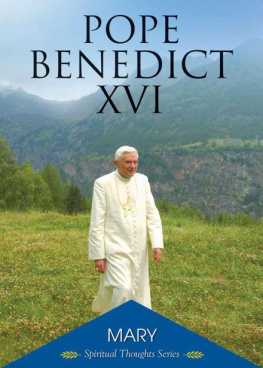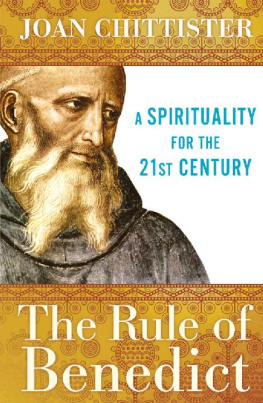Benedict XVI - Christmas (Spiritual Thoughts Series)
Here you can read online Benedict XVI - Christmas (Spiritual Thoughts Series) full text of the book (entire story) in english for free. Download pdf and epub, get meaning, cover and reviews about this ebook. year: 0, genre: Religion. Description of the work, (preface) as well as reviews are available. Best literature library LitArk.com created for fans of good reading and offers a wide selection of genres:
Romance novel
Science fiction
Adventure
Detective
Science
History
Home and family
Prose
Art
Politics
Computer
Non-fiction
Religion
Business
Children
Humor
Choose a favorite category and find really read worthwhile books. Enjoy immersion in the world of imagination, feel the emotions of the characters or learn something new for yourself, make an fascinating discovery.
- Book:Christmas (Spiritual Thoughts Series)
- Author:
- Genre:
- Year:0
- Rating:3 / 5
- Favourites:Add to favourites
- Your mark:
- 60
- 1
- 2
- 3
- 4
- 5
Christmas (Spiritual Thoughts Series): summary, description and annotation
We offer to read an annotation, description, summary or preface (depends on what the author of the book "Christmas (Spiritual Thoughts Series)" wrote himself). If you haven't found the necessary information about the book — write in the comments, we will try to find it.
Christmas (Spiritual Thoughts Series) — read online for free the complete book (whole text) full work
Below is the text of the book, divided by pages. System saving the place of the last page read, allows you to conveniently read the book "Christmas (Spiritual Thoughts Series)" online for free, without having to search again every time where you left off. Put a bookmark, and you can go to the page where you finished reading at any time.
Font size:
Interval:
Bookmark:

United States Conference of Catholic Bishops
Washington, DC
Pope Benedict XVI: Spiritual Thoughts in the First Year of His Papacy
The Eucharist
Family
Following Christ
Mary
The Priesthood
The Saints
St. Paul
Sickness
The Word of God
Young People
T o welcome the Savior and to recognize him in the humble Child lying in a manger. This is the mystery of Christmas.
Benedict XVI
The Mystery of Christmas
T he desire we all carry in our hearts is that in the midst of the frenzied activity of our day the forthcoming Feast of Christmas may give us serene and profound joy to make us tangibly feel the goodness of Our Lord and imbue us with new courage.
At Christmas God truly became the Emmanuel, the God-with-us from whom no barrier nor any distance can separate us. Thus, in that Child, God became close to each one of us, so close that we are able to speak intimately to him and engage in a trusting relationship of deep affection with him, just as we do with any newborn baby.
In that Child, in fact, God-Love is manifest: God comes without weapons, without force, because he does not want to conquer, so to speak, from the outside, but rather wants to be freely received by the human being. God makes himself a defenseless Child to overcome pride, violence and the human desire to possess. In Jesus God took on this poor, disarming condition to win us with love and lead us to our true identity. We must not forget that the most important title of Jesus Christ is, precisely, that of Son, Son of God; the divine dignity is indicated with a term that extends the reference to the humble condition of the manger in Bethlehem, although it corresponds uniquely to his divinity, which is the divinity of the Son.
His condition as a Child also points out to us how we may encounter God and enjoy his presence. It is in the light of Christmas that we may understand Jesus words: Unless you turn and become like children, you will never enter the Kingdom of Heaven (Mt 18:3). Those who have not understood the mystery of Christmas, have not understood the crucial element of Christian life. Those who do not welcome Jesus with a childs heart, cannot enter into the Kingdom of Heaven. Let us pray the Father to grant us that simplicity of heart which recognizes the Lord in the Child.

________________
This preface is taken from the General Audience of December 23, 2009.

Christ, the Son of God brings to the dark, cold and unredeemed world into which he is born a new hope and a new splendor. If man lets himself be moved and enlightened by the splendor of the living truth that is Christ, he will feel inner peace in his heart and will become a peacemaker in a society that so longs for reconciliation and redemption.
Address to pilgrims from Lower Austria
December 12, 2008

The essential meaning of the word adventus was: God is here, he has not withdrawn from the world, he has not deserted us. Even if we cannot see and touch him as we can tangible realities, he is here and comes to visit us in many ways.
Homily at First Vespers of Advent
November 28, 2009
Advent, this powerful liturgical season that we are beginning, invites us to pause in silence to understand a presence. It is an invitation to understand that the individual events of the day are hints that God is giving us, signs of the attention he has for each one of us.
Homily at First Vespers of Advent
November 28, 2009
The question is: Is the humanity of our time still waiting for a Savior? One has the feeling that many consider God as foreign to their own interests. Apparently, they do not need him. They live as though he did not exist and, worse still, as though he were an obstacle to remove in order to fulfill themselves. Even among believerswe are sure of itsome let themselves be attracted by enticing dreams and distracted by misleading doctrines that suggest deceptive shortcuts to happiness. Yet, despite its contradictions, worries and tragedies, and perhaps precisely because of them, humanity today seeks a path of renewal, of salvation, it seeks a Savior and awaits, sometimes unconsciously, the coming of the Savior who renews the world and our life, the coming of Christ, the one true Redeemer of man and of the whole of man.
General Audience
December 20, 2006
Christmas is a privileged opportunity to meditate on the meaning and value of our existence. The approach of this Solemnity helps us on the one hand to reflect on the drama of history in which people, injured by sin, are perennially in search of happiness and of a fulfilling sense of life and death; and on the other, it urges us to meditate on the merciful kindness of God who came to man to communicate to him directly the Truth that saves, and to enable him to partake in his friendship and his life. Therefore let us prepare ourselves for Christmas with humility and simplicity, making ourselves ready to receive as a gift the light, joy and peace that shine from this mystery.
General Audience
December 17, 2008
Thus, to prepare oneself for Christmas means to be committed to building the dwelling of God with men. No one is excluded; everyone can and must contribute in order to make this house of communion more spacious and beautiful.
Angelus
December 10, 2006
In todays consumer society, this period [of Advent] has unfortunately suffered a sort of commercial pollution that risks changing its authentic spirit, marked by recollection, moderation and joy, which is not external but intimate. It is thus providential that almost as a portal to Christmas there should be the feast of the one who is the Mother of Jesus and who, better than anyone else, can lead us to know, love and adore the Son of God made man. Let us therefore allow her to accompany us; may her sentiments prompt us to prepare ourselves with heartfelt sincerity and openness of spirit to recognize in the Child of Bethlehem the Son of God who came into the world for our redemption. Let us walk together with her in prayer and accept the repeated invitation that the Advent liturgy addresses to us to remain in expectationwatchful and joyful expectationfor the Lord will not delay: he comes to set his people free from sin.
Angelus
December 11, 2005

In the first [coming], St. Bernard wrote, Christ was our redemption; in the last coming he will reveal himself to us as our life: in this lies our repose and consolation ( Discourse 5 on Advent, 1). The archetype for that coming of Christ, which we might call a spiritual incarnation, is always Mary. Just as the Virgin Mother pondered in her heart on the Word made flesh, so every individual soul and the entire Church are called during their earthly pilgrimage to wait for Christ who comes and to welcome him with faith and love ever new.
Font size:
Interval:
Bookmark:
Similar books «Christmas (Spiritual Thoughts Series)»
Look at similar books to Christmas (Spiritual Thoughts Series). We have selected literature similar in name and meaning in the hope of providing readers with more options to find new, interesting, not yet read works.
Discussion, reviews of the book Christmas (Spiritual Thoughts Series) and just readers' own opinions. Leave your comments, write what you think about the work, its meaning or the main characters. Specify what exactly you liked and what you didn't like, and why you think so.

